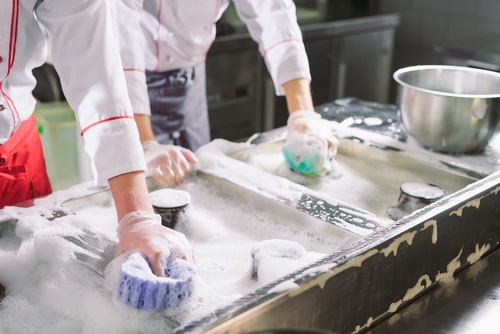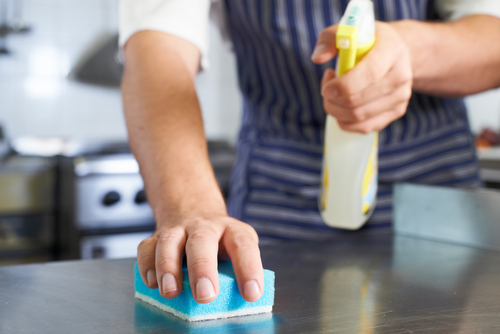
Safe Pest Control for Food Establishments
September 29, 2023
Eco-Friendly Approaches to Bed Bug Control
November 25, 2023Rodent Control for Commercial Kitchens in Singapore

Rodent Control for Commercial Kitchens in Singapore
Rodent Control for Commercial Kitchens in Singapore. In the bustling culinary world of Singapore, the art of creating exquisite dishes is not without its challenges, and one such challenge is rodent infestations in commercial kitchens.
These unwanted guests pose significant health and safety risks and carry legal implications.
In this comprehensive guide, we’ll delve into the various aspects of rodent control specifically tailored for Singaporean kitchens.
By the end of this article, you’ll be well-equipped to keep your commercial kitchen rodent-free and ensure compliance with food safety regulations.
The Significance of Rodent Control in Commercial Kitchens
Maintaining a rodent-free environment is paramount for commercial kitchens. Rodents can carry diseases and contaminate food, putting the health and safety of your customers at risk. The importance of rodent control cannot be overstated.
Commercial kitchens have abundant food and shelter, making them attractive to rodents. Their presence can lead to costly food wastage, property damage, and a tarnished reputation.
This article is structured to provide a step-by-step guide for effective rodent control in Singaporean kitchens, covering everything from identifying common rodent species to compliance with food safety regulations.
The Risk of Rodents in Commercial Kitchens

Health and Safety Concerns
Rodents can transmit diseases through their droppings and urine, making them a significant health hazard. The risks are even greater in a food preparation area as contamination can occur quickly.
Legal and Regulatory
Singaporean authorities have strict regulations regarding food safety. A rodent infestation can lead to penalties, suspension of operations, and even closure. Compliance with these regulations is non-negotiable.
The longer you delay taking action, the greater the risks become. Immediate measures are necessary to protect your kitchen’s reputation and the health of your customers.
Identifying Common Rodent Species in Singaporean Kitchens
In Singapore, common rodent species include the house mouse, Norway rat, and roof rat. Understanding these species is essential for effective control.
Understanding Their Behavior and Nesting Habits
Each rodent species has unique behavior and nesting habits. Knowing these specifics is key to implementing targeted control strategies.
Recognizing Signs of Rodent Presence
Rodents leave behind telltale signs such as droppings, gnaw marks, and tracks. Recognizing these signs early can help you act proactively.
Comprehensive Kitchen Cleanliness

A clean kitchen is a deterrent for rodents. Regular cleaning routines are essential to eliminate food and water sources.
Kitchen staff should follow a strict cleaning schedule, including disinfecting surfaces, emptying trash bins, and properly storing food items.
Educating your staff about rodent risks and prevention measures is vital. They should be vigilant and proactive in maintaining kitchen cleanliness.
Effective Waste Management
- Dispose of food waste promptly and correctly. Seal waste bags tightly to prevent rodent attraction.
- Trash bins and dumpsters should be rodent-resistant. Regular cleaning and maintenance are crucial.
- Work with waste management services that follow best rodent control and sanitation practices.
Sealing Entry Points
Inspect your kitchen for any gaps, cracks, or openings where rodents could enter.
Seal entry points with rodent-proof materials such as steel wool or caulk. Regular inspections are essential to identify and address new entry points.
Preventative maintenance and regular inspections are key to keeping entry points secure.
Pest-Resistant Food Storage
- Store food items in airtight containers and elevate them off the ground to deter rodents.
- Invest in pest-resistant storage solutions to protect your food supplies.
- Frequent inventory checks help you identify any signs of rodent activity and prevent contamination.
Regular Inspections and Monitoring
Periodic inspections by pest control professionals can uncover issues before they escalate.
Train your staff to recognize and report any signs of rodent activity promptly. Have clear protocols in place for reporting and responding to rodent sightings or signs.
Non-Toxic Pest Control Methods

- Explore non-toxic methods such as ultrasonic repellent devices and natural deterrents.
- When traps are necessary, place them strategically in areas with high rodent activity.
- Evaluate the effectiveness of rodent-repelling devices and use them as part of your prevention strategy.
Expert Pest Control Services
Professional pest control services provide expertise and comprehensive solutions to keep your kitchen rodent-free.
Choose a reputable pest control provider in Singapore with experience in the food service industry.
Regular inspections and treatments are essential for ongoing rodent control.
Compliance with Food Safety Regulations
Familiarize yourself with Singapore’s stringent food safety regulations to ensure compliance. Rodent control is intrinsically linked to food safety. A rodent-free kitchen is a safe kitchen.
Non-compliance with food safety regulations can result in fines, closure, and damage to your reputation.
Staff Training and Awareness
- Staff should be well-informed about the risks and prevention measures.
- Promote a culture of vigilance and proactivity among your staff.
- Staff should feel encouraged to report any rodent-related issues and take immediate action.
Frequently Asked Questions

How Often Should Commercial Kitchens Have Professional Inspections?
Regular professional inspections should be conducted at least quarterly.
What Are the Legal Consequences of Rodent Infestations in Singaporean Kitchens?
Legal consequences may include fines, suspension of operations, and reputational damage.
Can Rodent Control in Kitchens Be 100% Effective?
While 100% effectiveness is challenging, a proactive approach can minimize risks.
Are There Any Natural Rodent Repellents Suitable for Commercial Kitchens?
Natural repellents like peppermint oil and cedarwood can be used alongside other control methods.
Rodent Control for Commercial Kitchens in Singapore – Conclusion

Rodent control is not an option but a necessity for food service establishments in Singapore. It is an ongoing process that demands commitment and diligence.
Take immediate action to implement the strategies outlined in this article. Your kitchen’s reputation and your customers’ health depend on it!
Are you seeking professional and reliable pest control services in Singapore? Contact us today!



